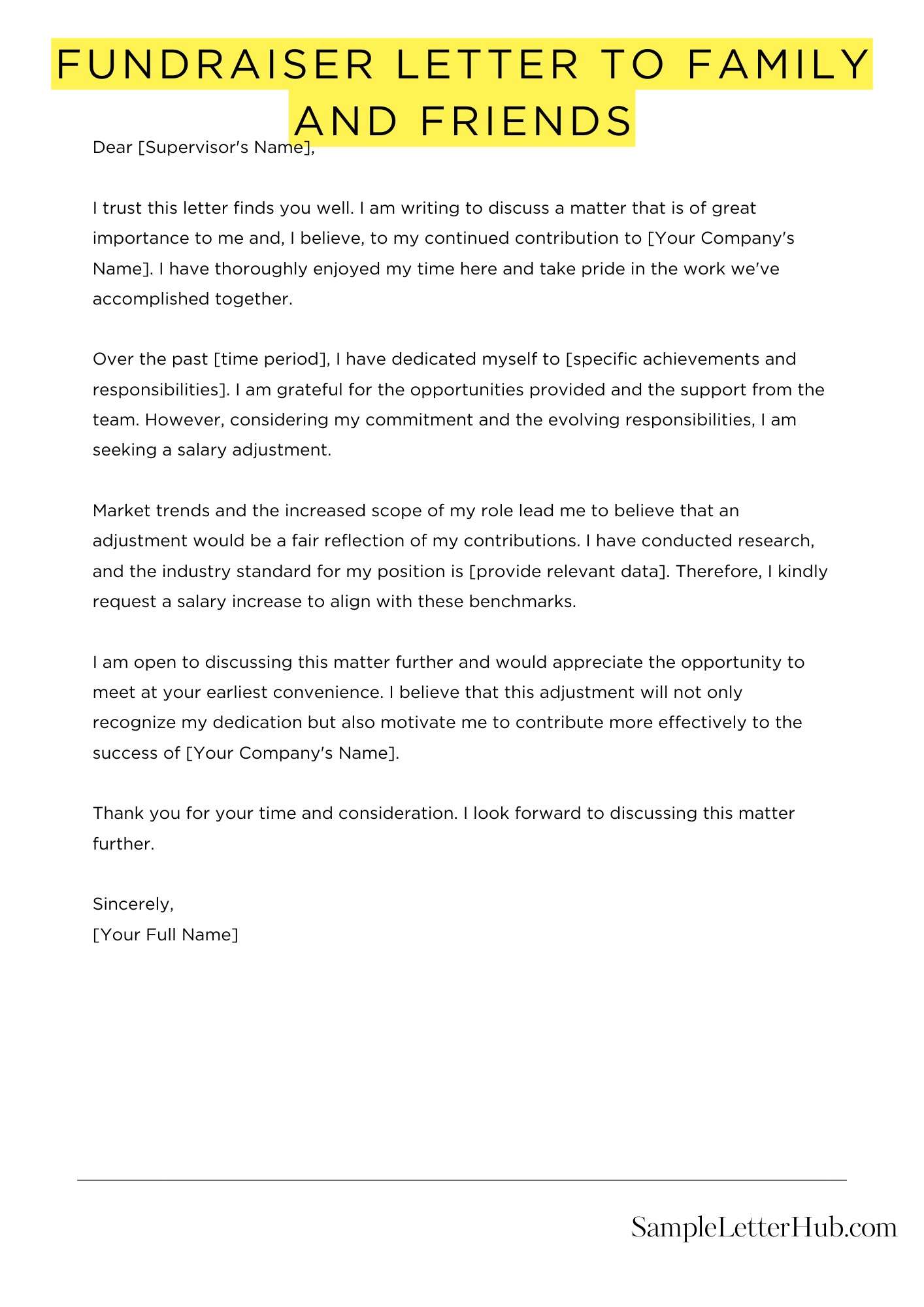This article is about writing a fundraiser letter to family and friends. A fundraiser letter is a type of letter that is written to ask for donations for a specific cause or event. The purpose of a fundraiser letter is to persuade the reader to donate money to the cause or event.
In this article, we will share some templates, examples, and samples of fundraiser letters to family and friends. These templates, examples, and samples will help you to write a persuasive fundraiser letter that will get results. We will also provide you with some tips on how to write a successful fundraiser letter.
A Letter from the Heart: Join Us in Making a Difference
Dear Family and Friends,
I hope this letter finds you well. I am writing to you today with a heartfelt request for your support in a cause that is close to my heart.
As you know, [Name of organization] has been working tirelessly to [State the organization’s mission]. Their dedication to [Describe the organization’s impact] has inspired me to become involved in their efforts.
I am organizing a fundraiser to raise funds for this worthy cause. Every dollar raised will go directly towards [State the specific purpose of the funds]. Your contribution, no matter how small, will make a significant difference in the lives of those they serve.
I understand that times are tough for many of us, but I urge you to consider making a donation. Together, we can make a positive impact on our community.
You can donate online at [Website address] or by sending a check to [Address].
Thank you for your time and consideration. Your support is greatly appreciated.
With love and gratitude,
[Your name]

How to Write a Compelling Fundraiser Letter to Family and Friends
Writing a fundraiser letter to family and friends can be a daunting task, but it’s an essential step in securing support for your cause. By following these tips, you can craft a persuasive letter that will resonate with your audience and inspire them to donate.
1. Start with a Strong Opening
The opening paragraph of your letter is crucial. It should grab the reader’s attention and make them want to learn more. Start with a personal anecdote or a compelling statistic that highlights the need for your cause.
2. Tell Your Story
People are more likely to donate to a cause they can relate to. In the body of your letter, tell the story of your organization and why you’re passionate about its mission. Use specific examples to illustrate the impact of your work.
3. Quantify Your Needs
Don’t be afraid to ask for specific amounts of money. However, be sure to justify your request by providing a detailed budget or explaining how the funds will be used.
4. Make It Personal
Personalize your letter by addressing each recipient by name. If possible, mention a specific connection you have with them or why you believe they would be interested in supporting your cause.
5. Use Emotional Language
Don’t be afraid to use emotional language to connect with your audience. However, avoid being overly sentimental or manipulative. Instead, focus on conveying the urgency and importance of your cause.
6. Include a Call to Action
End your letter with a clear call to action. Tell your readers how they can donate and provide them with all the necessary information, such as your website or mailing address.
7. Proofread Carefully
Before you send out your letter, proofread it carefully for any errors in grammar, spelling, or punctuation. A well-written letter will make a positive impression on your readers and increase the likelihood of them donating.
FAQs about Fundraiser Letter To Family And Friends
1. What should I include in a fundraiser letter to family and friends?
When writing a fundraiser letter to family and friends, it’s important to include a personal introduction, a compelling reason for the fundraiser, a specific request for support, and information on how to donate.
2. How should I personalize the fundraiser letter for each recipient?
Personalizing the fundraiser letter for each recipient can involve mentioning specific memories or experiences shared with the recipient, addressing them by name, and highlighting their personal connection to the cause.
3. Should I include a specific fundraising goal in the letter?
Yes, it’s important to include a specific fundraising goal in the letter to provide clarity and encourage donors to understand the impact of their contributions. Be transparent about how the funds will be used.
4. How can I make the fundraiser letter stand out and grab attention?
To make the fundraiser letter stand out, consider using eye-catching visuals, telling a compelling story, and showcasing the impact of previous fundraising efforts. Be genuine and heartfelt in your tone.
5. What are some best practices for following up with family and friends after sending the fundraiser letter?
After sending the fundraiser letter, it’s important to follow up with gratitude and updates on the progress of the fundraising efforts. Express appreciation for their support, and provide them with meaningful feedback on how their contributions have made a difference. Additionally, be respectful of those who may not be able to contribute.

